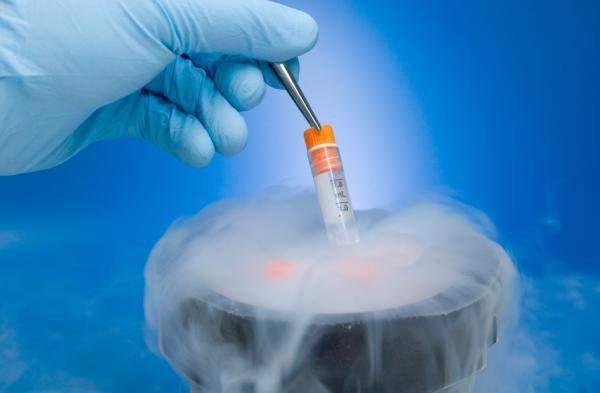Regulations on donation and receipt of sperm, eggs and embryos in Vietnam
What are the regulations on donation and receipt of sperm, eggs and embryos in Vietnam? - Thuy An (Tay Ninh, Vietnam)

Regulations on donation and receipt of sperm, eggs and embryos in Vietnam (Internet image)
Regarding this issue, LawNet would like to answer as follows:
1. Regulations on donation of sperm and eggs in Vietnam
According to Article 4 of Decree 10/2015/ND-CP, regulations on donation of sperm and eggs are as follows:
- A sperm or an egg donor shall be examined and tested to make sure that he/she suffers no hereditary disease which can affect subsequent generations; suffers no mental or another disease which deprives him/her of the capacity to perceive and control his/her acts; and does not contract HIV
- Sperm or eggs shall be donated on a voluntary basis only at a single medical examination and treatment establishment recognized by the Ministry of Health as qualified to perform in vitro fertilization.
- Medical examination and treatment establishments may not provide names, ages, addresses and images of sperm donors.
- Sperm or eggs of a donor shall be used for only one person and may be used for another person only in case the childbirth fails. In case the childbirth is successful, all unused sperm or eggs shall be destroyed or donated to scientific research institutions.
2. Regulations on receipt of sperm, eggs and embryos in Vietnam
Regulations on receipt of sperm, eggs and embryos according to Article 5 of Decree 10/2015/ND-CP are as follows:
- A sperm recipient must be the wife of a couple under infertility treatment of whom the husband is infertile, or be a single woman who wishes to have a baby and whose eggs are qualified for impregnation.
- An egg recipient must be a Vietnamese or of Vietnamese origin who is the wife of a couple under infertility treatment and who has no egg or whose eggs are unqualified for impregnation.
- An embryo recipient must be:
+ The wife of a couple under infertility treatment both of whom are infertile;
+ The wife of a couple under infertility treatment who has applied in vitro fertilization in vain, except the case of gestational surrogacy; or
+ A single woman who has no egg or whose eggs are unqualified for impregnation.
- A sperm or an egg or embryo recipient must be physically fit for in vitro fertilization, pregnancy and childbirth; currently suffer no sexually transmitted disease, no contagious disease of group A or B; no hereditary disease which can affect subsequent generations; and no mental or another disease which deprives her of the capacity to perceive and control her acts, and must not contract HIV.
- Medical examination and treatment establishments may not provide names, ages, addresses and images of sperm and embryo recipients.
3. Regulations on depositing sperm, eggs and embryos in Vietnam
According to Article 21 of Decree 10/2015/ND-CP, regulations on depositing sperm, eggs and embryos are as follows:
- Sperm, eggs or embryos shall be deposited by the following persons:
+ The husband or wife of a couple under infertility treatment;
+ A person who wishes to keep them personally;
+ A voluntary donor;
+ An infertile couple or a single woman who stores surplus embryos after successful in vitro fertilization.
- When receiving a notice together with a lawful copy of the death certificate of a depositor from his/her family, the establishment storing sperm, eggs or embryos of that person shall destroy them, unless the spouse of that person makes a written request for storage and still pays the storage and preservation charge.
- For a depositor of sperm, eggs or embryos who gets divorced:
+ His sperm or her eggs shall be destroyed at his/her request;
+ For request for destruction of embryos, written consent of both husband and wife is required. For request for continued storage, a written request for storage and payment of storage and preservation charges are required.
- A spouse who uses sperm, eggs or embryos in the case prescribed in Clause 2, or at Point b, Clause 3 of Article 21 of Decree 10/2015/ND-CP, resulting in relations other than marriage and family relations shall comply with the law on marriage and family and the civil law.
- For a depositor of sperm, eggs or embryos who wishes to donate them to the storing establishment for use for others, the storing establishment shall encode information of this donor. In case of donation for scientific research, such encoding is not required.
- Key word:
- embryos in Vietnam
- Cases of land rent exemption and reduction under the latest regulations in Vietnam
- Economic infrastructure and social infrastructure system in Thu Duc City, Ho Chi Minh City
- Regulations on ordination with foreign elements in religious organizations in Vietnam
- Increase land compensation prices in Vietnam from January 1, 2026
- Determination of land compensation levels for damage during land requisition process in Vietnam
- Who is permitted to purchase social housing according to latest regulations in Vietnam?
-

- Notable new policies of Vietnam effective as of ...
- 16:26, 11/04/2025
-
.Medium.png)
- Notable documents of Vietnam in the previous week ...
- 16:21, 11/04/2025
-
.Medium.png)
- Notable documents of Vietnam in the previous week ...
- 16:11, 02/04/2025
-
.Medium.png)
- Notable new policies of Vietnam to be effective ...
- 16:04, 02/04/2025
-
.Medium.png)
- Notable new policies of Vietnam effective from ...
- 14:51, 21/03/2025

 Article table of contents
Article table of contents
